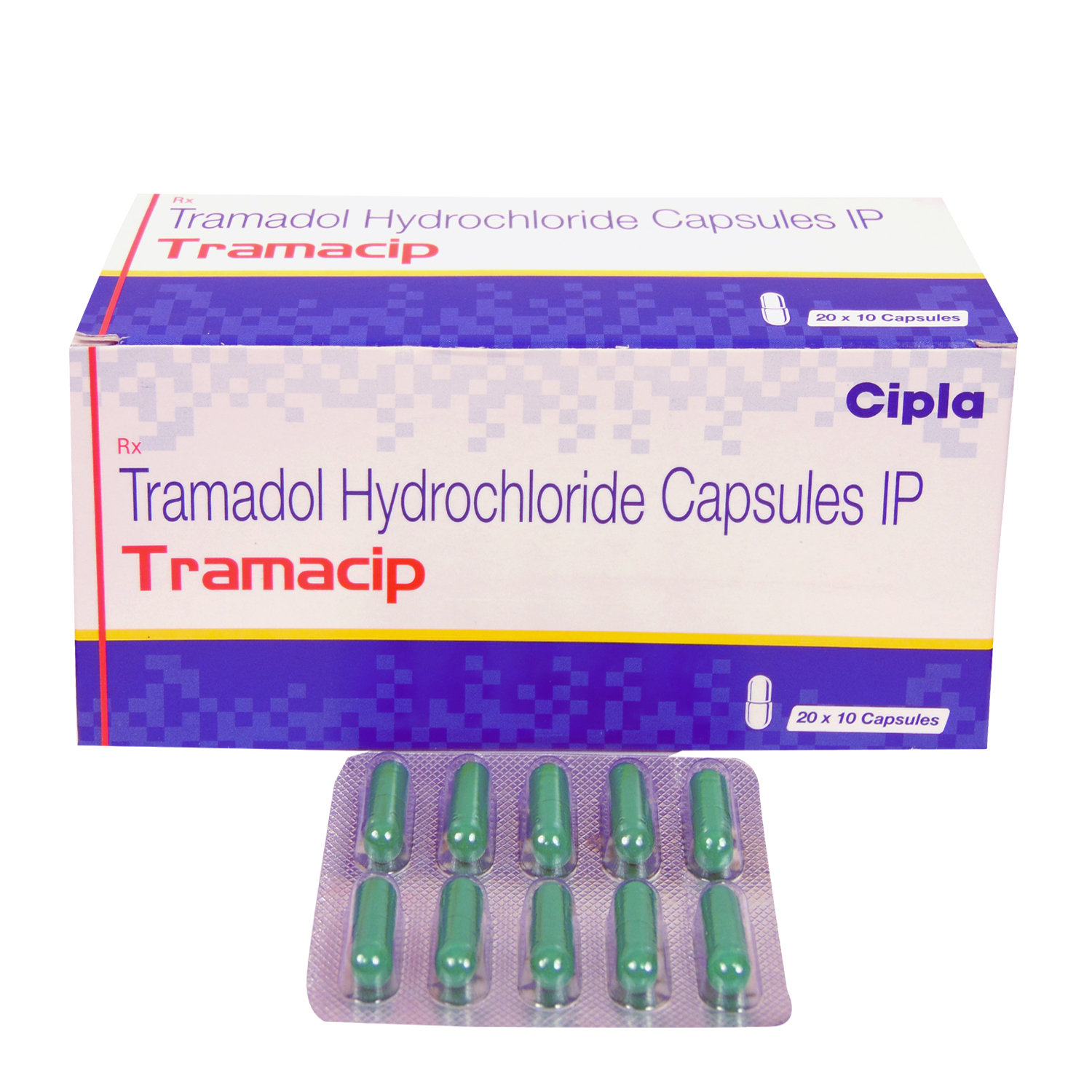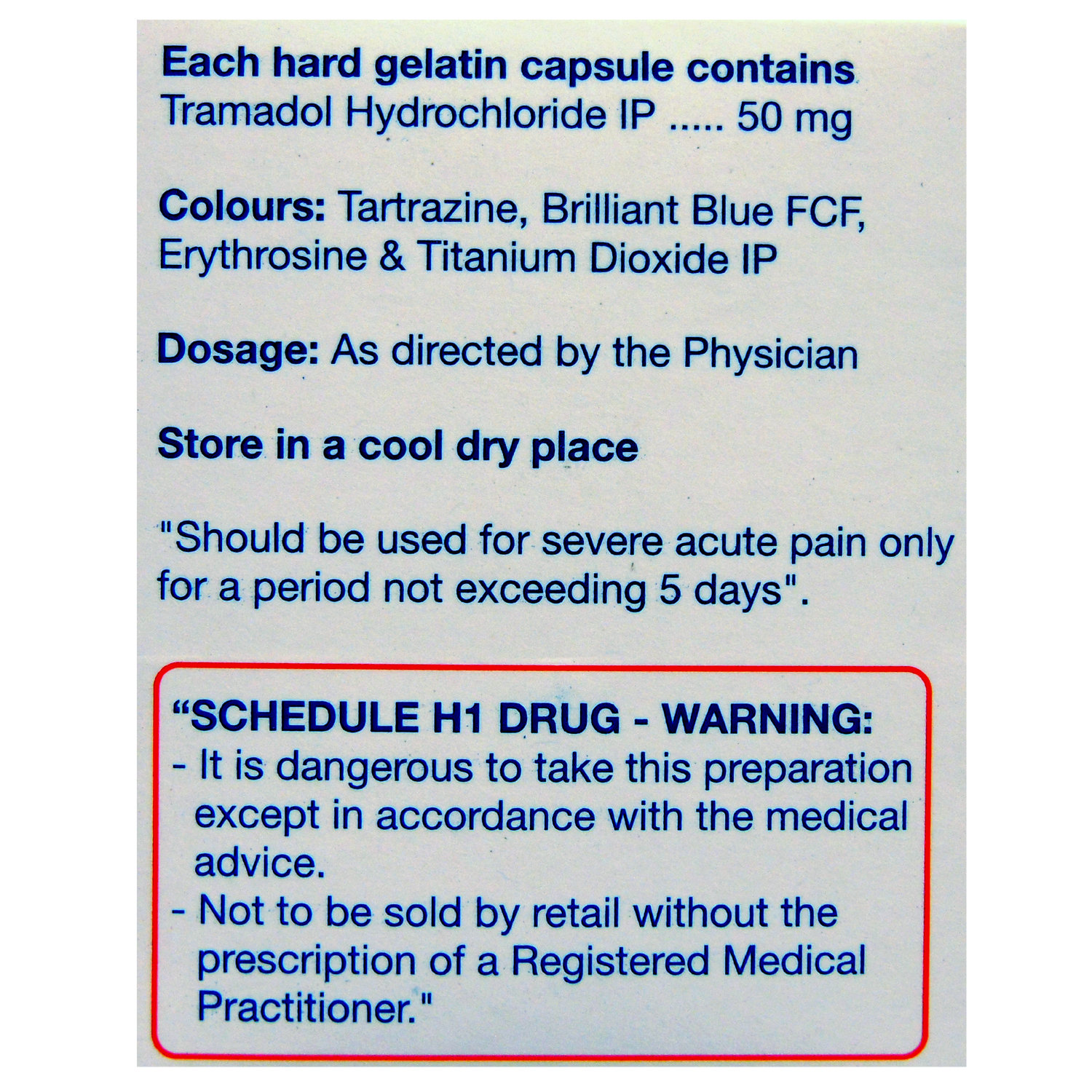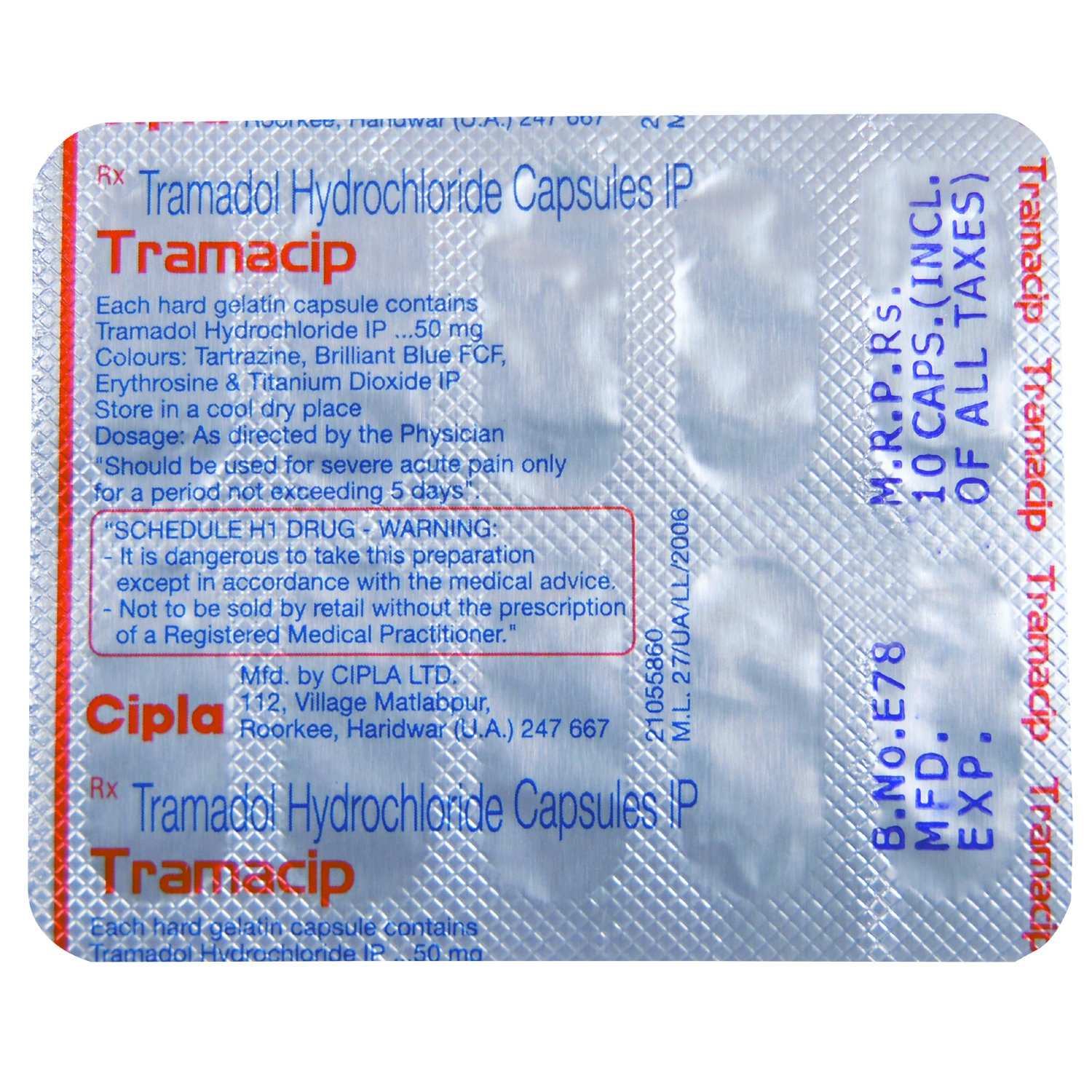TRAMACIP CAPSULE
MRP ₹53.5
(Inclusive of all Taxes)
₹8.0 Cashback (15%)
Provide Delivery Location
Online payment accepted
 Prescription drug
Prescription drugWhats That
Composition :
Manufacturer/Marketer :
Consume Type :
Expires on or after :
Return Policy :
About TRAMACIP CAPSULE
TRAMACIP CAPSULE belongs to a class of drugs called opioid analgesics (pain killers). TRAMACIP CAPSULE is primarily used to prevent and treat moderate to severe pain. Pain is an unpleasant sensation caused by an injury or illness. Pain may be acute (short term) or chronic (long term). It can be general (overall body pains) or localized (pain in a specific area of the body).
TRAMACIP CAPSULE contains Tramadol which works by mimicking the action of endorphins (pain-reducing chemicals) in the brain and spinal cord. Thereby inhibits the transmission of pain signals from nerves to the brain. Also, TRAMACIP CAPSULE improves the effect of serotonin and noradrenaline (chemical messengers in the brain and spinal cord) and helps in relieving pain.
Take TRAMACIP CAPSULE as prescribed. Your doctor will advise you how often you take TRAMACIP CAPSULE based on your medical condition. In some cases, you may experience nausea, dizziness, headache, vomiting, dry mouth, drowsiness, constipation, sweating or tiredness. Most of these side effects of TRAMACIP CAPSULE do not require medical attention and gradually resolve over time. However, if the side effects worsen or persist, please consult your doctor.
If you are known to be allergic to TRAMACIP CAPSULE or any other medicines, please tell your doctor. TRAMACIP CAPSULE is not recommended for children below 12 years of age. If you are pregnant or breastfeeding or have a history of fits, please inform your doctor before taking TRAMACIP CAPSULE. Do not consume alcohol with TRAMACIP CAPSULE as it may increase the risk of side effects. Avoid frequent or high doses as it may lead to addiction.
Uses of TRAMACIP CAPSULE
Directions for Use
Key Benefits
TRAMACIP CAPSULE is a pain killer that works by mimicking the action of endorphins (pain-reducing chemicals) in the brain, thereby, inhibiting the transmission of pain signals from nerves to the brain. Thus, TRAMACIP CAPSULE improves the effect of serotonin and noradrenaline (chemical messengers in the brain and spinal cord) and helps in relieving pain. TRAMACIP CAPSULE is used to relieve pain after surgery, pain caused by an injury or illness.
Storage
- Inform your doctor about the nausea and discuss possible alternatives to the medication or adjustments to the dosage.
- Divide your daily food intake into smaller, more frequent meals to reduce nausea.
- Opt for bland, easily digestible foods like crackers, toast, plain rice, bananas, and applesauce.
- Avoid certain foods that can trigger nausea, such as fatty, greasy, spicy, and smelly foods.
- Drink plenty of fluids, such as water, clear broth, or electrolyte-rich beverages like coconut water or sports drinks.
- Use ginger (tea, ale, or candies) to help relieve nausea.
- Get adequate rest and also avoid strenuous activities that can worsen nausea.
- Talk to your doctor about taking anti-nausea medication if your nausea is severe.
- Record when your nausea occurs, what triggers it, and what provides relief to help you identify patterns and manage your symptoms more effectively.
- Inform your doctor about dizziness symptoms. They may adjust your medication regimen or prescribe additional medications to manage symptoms.
- Follow your doctor's instructions for taking medication, and take it at the same time every day to minimize dizziness.
- When standing up, do so slowly and carefully to avoid sudden dizziness.
- Avoid making sudden movements, such as turning or bending quickly, which can exacerbate dizziness.
- Drink plenty of water throughout the day to stay hydrated and help alleviate dizziness symptoms.
- If you're feeling dizzy, sit or lie down and rest until the dizziness passes.
- Track when dizziness occurs and any factors that may trigger it, and share this information with your doctor to help manage symptoms.
- Consult your doctor if you experience skin redness, itching, or irritation after taking medication.
- Your doctor may adjust your treatment plan by changing your medication or providing guidance on managing your erythema symptoms.
- Your doctor may recommend or prescribe certain medications to help alleviate symptoms.
- Apply cool compresses or calamine lotion to the affected skin area to reduce redness and itching.
- Stay hydrated by drinking plenty of water to help alleviate symptoms and keep your skin hydrated.
- Monitor your skin condition closely and promptly report any changes, worsening symptoms, or concerns to your healthcare provider.
- Inform your doctor about your constipation symptoms. They may adjust your medication or advise alternative treatments.
- Stay hydrated by drinking sufficient of water (at least 8-10 glasses a day) to help soften stool and promote bowel movements.
- Increase fibre intake by eating foods high in fibre, such as fruits, whole grains, vegetables and legumes, to help bulk up the stool.
- Establish a bowel routine by trying to go to the bathroom at the same time each day to train your bowels.
- Engaging in regular exercise, like walking or yoga, can support in bowel movement stimulation.
- Consult your doctor if constipation persists, and discuss alternative treatments or adjustments to your medication.
- Preventing Vomiting (Before it Happens)
- Take medication exactly as prescribed by your doctor. This can help minimize side effects, including vomiting.
- Having a small meal before taking your medication can help reduce nausea and vomiting.
- Talk to your doctor about taking anti-nausea medication along with your prescribed medication.
- Managing Vomiting (If it Happens)
- Try taking ginger in the form of tea, ale, or candy to help alleviate nausea and vomiting.
- What to Do if Vomiting Persists
- Consult your doctor if vomiting continues or worsens, consult the doctor for guidance on adjusting your medication or additional treatment.
- Take medications with food (if recommended): It can help prevent stomach distress and indigestion.
- Eat smaller, more frequent meals: Divide daily food intake into smaller, more frequent meals to ease digestion.
- Avoid trigger foods: Identify and avoid foods that trigger indigestion, such as spicy, fatty, or acidic foods.
- Stay upright after eating: Sit or stand upright for at least 1-2 hours after eating to prevent stomach acid from flowing into the oesophagus.
- Avoid carbonated drinks: Avoid drinking carbonated beverages, such as soda or beer, which can worsen indigestion.
- Manage stress: To alleviate indigestion, engage in stress-reducing activities like deep breathing exercises or meditation.
- Consult a doctor if needed: If indigestion worsens or persists, consult a healthcare professional to adjust the medication regimen or explore alternative treatments.
Drug Warnings
Do not stop taking TRAMACIP CAPSULE suddenly as it may cause withdrawal symptoms. Avoid frequent or high doses as it may lead to addiction. If you are known to be allergic to TRAMACIP CAPSULE or any other medicines, please tell your doctor. TRAMACIP CAPSULE is not recommended for children below 12 years of age and for children suffering from breathing problems as it may worsen the symptoms of TRAMACIP CAPSULE toxicity. If you are pregnant or breastfeeding or have a history of epilepsy (fits), please inform your doctor before taking TRAMACIP CAPSULE. Do not consume alcohol with TRAMACIP CAPSULE as it may increase the risk of side effects. TRAMACIP CAPSULE should be taken with caution by the patients taking sleeping pills, tranquillizers, hypnotics or other opiate containing pain killers.
Drug-Drug Interactions
Drug-Drug Interactions
Login/Sign Up
Taking rasagiline with Tramacip Capsule can increase the risk of serotonin syndrome (A condition in which a chemical called serotonin increase in your body).
How to manage the interaction:
Taking Tramacip Capsule with Rasagiline is not recommended, as it can lead to an interaction, but can be taken if advised by your doctor. However, if you experience any symptoms like severe headache, blurred vision, confusion, seizures, chest pain, nausea or vomiting, sudden numbness or weakness (especially on one side of the body), speech difficulties, fever, sweating, lightheadedness, and fainting, contact your doctor immediately. Do not discontinue any medications without first consulting your doctor.
Combining Tranylcypromine with Tramacip Capsule can increase the risk of serotonin syndrome (a condition in which a chemical called serotonin increase in your body).
How to manage the interaction:
Taking Tranylcypromine with Tramacip Capsule is not recommended, but can be taken together if prescribed by a doctor. However, consult a doctor if you experience confusion, hallucination(seeing and hearing things that do not exist), fits, blood pressure alteration, increased heart rate, fever, excessive sweating, shivering or shaking, blurred vision, pain in the muscles or stiffness, incoordination, stomach cramps, nausea, vomiting, and diarrhea. Do not discontinue any medications without consulting your doctor.
Taking Safinamide with Tramacip Capsule can increase the risk of serotonin syndrome (A condition in which a chemical called serotonin increase in your body).
How to manage the interaction:
Taking Safinamide with Tramacip Capsule is not recommended as it can possibly result in an interaction, but can be taken together if prescribed by a doctor. However, consult a doctor if you experience confusion, hallucination(seeing and hearing things that do not exist), fits, blood pressure alteration, increased heart rate, fever, excessive sweating, shivering or shaking, blurred vision, pain in the muscles or stiffness, incoordination, stomach cramps, nausea, vomiting, and loose stools. Do not discontinue any medications without consulting your doctor.
Combining Phenelzine with Tramacip Capsule can increase the risk of serotonin syndrome and seizures.
How to manage the interaction:
Taking Tramacip Capsule with Phenelzine is not recommended, please consult your doctor before taking it.
Co-administration of Linezolid with Tramacip Capsule can increase the risk of serotonin syndrome and seizures.
How to manage the interaction:
Taking Linezolid with Tramacip Capsule is not recommended, consult a doctor before taking it. Consult a doctor if you experience confusion, hallucination, seizure, extreme changes in blood pressure, increased heart rate, fever, excessive sweating, shivering or shaking, blurred vision, muscle spasm or stiffness, tremor, incoordination, stomach cramp, nausea, vomiting, and diarrhea. Do not stop using any medications without talking to a doctor.
Co-administration of Tramacip Capsule with Alvimopan can make the side effects worse or more dangerous.
How to manage the interaction:
Taking Alvimopan with Tramacip Capsule is not recommended, please consult your doctor before taking it.
Co-administration of Ziprasidone with Tramacip Capsule can increase the risk of irregular heart rhythm.
How to manage the interaction:
Taking Tramacip Capsule with Ziprasidone together can possibly result in an interaction, but it can be taken if a doctor has advised it. However, consult a doctor immediately if you experience sudden dizziness, lightheadedness, fainting, shortness of breath, or heart palpitations. Do not discontinue any medications without consulting a doctor.
Co-administration of metoclopramide with Tramacip Capsule may increase the risk of seizures(fits).
How to manage the interaction:
Although there is a possible interaction between metoclopramide and Tramacip Capsule, you can take these medicines together if prescribed by your doctor. Do not stop using medications without a doctor's advice.
Co-administration of oxazepam with Tramacip Capsule can increase the risk of irregular heart rhythms.
How to manage the interaction:
Taking oxazepam with Tramacip Capsule together is generally avoided as it can possibly result in an interaction, but it can be taken if your doctor has advised it. However, contact a doctor immediately if you experience dizziness, lightheadedness, fainting, shortness of breath, or irregular heartbeat. Do not discontinue any medications without consulting a doctor.
Co-administration of Tramacip Capsule with mifepristone can increase the risk of irregular heart rhythms.
How to manage the interaction:
Taking Tramacip Capsule with mifepristone together can result in an interaction, it can be taken if a doctor has advised it. However, contact a doctor immediately if you experience any symptoms such as dizziness, lightheadedness, fainting, shortness of breath, or irregular heartbeat. Do not discontinue any medications without consulting a doctor.
Drug-Food Interactions
Drug-Food Interactions
Login/Sign Up
Diet & Lifestyle Advise
- Do regular exercise such as swimming or walking.
- Drink plenty of water while taking TRAMACIP CAPSULE to avoid dry mouth.
- Maintain a fibre rich diet and eat plenty of fresh fruits and vegetables to avoid constipation while taking TRAMACIP CAPSULE.
- Avoid consumption of alcohol and quit smoking.
Side Effects of TRAMACIP CAPSULE
- Nausea
- Dizziness
- Headache
- Vomiting
- Dry mouth
- Drowsiness
- Constipation
- Sweating
- Tiredness
Habit Forming
Therapeutic Class
All Substitutes & Brand Comparisons
RX
Out of StockNot for online saleContramal 50 mg Capsule 10's
Abbott India Ltd
₹47.48
(₹4.27 per unit)
11% CHEAPERRX
Out of StockNot for online saleNeutram Capsule 10's
East West Pharma India Pvt Ltd
₹47.5
(₹4.28 per unit)
11% CHEAPERRX
Not for online saleTramazac Capsule 10's
Cadila Pharmaceuticals Ltd
₹50.5
(₹4.55 per unit)
5% CHEAPER
Author Details
We provide you with authentic, trustworthy and relevant information
Drug-Diseases Interactions
Drug-Diseases Interactions
Login/Sign Up
FAQs
Yes, TRAMACIP CAPSULE may cause withdrawal symptoms such as irritability, anxiety, restlessness, difficulty in sleeping, palpitations (feeling your heartbeat), feeling sick, shivering, sweating, high blood pressure and shaking when you stop taking TRAMACIP CAPSULE suddenly. Therefore, if you experience any difficulty while taking TRAMACIP CAPSULE, do not stop taking suddenly and consult your doctor so that the dose may be reduced gradually to avoid withdrawal symptoms.
No, TRAMACIP CAPSULE is not recommended for use during pregnancy as baby may develop dependence on TRAMACIP CAPSULE and lead to withdrawal symptoms after birth. Therefore, if you are pregnant or planning for pregnancy, please inform your doctor before taking TRAMACIP CAPSULE.
Yes, TRAMACIP CAPSULE may cause dry mouth as a common side effect. It is not necessary for everyone taking TRAMACIP CAPSULE to experience this side effect. However, drink plenty of water, suck on sugar candy or chew sugar free gum to prevent such side effects while taking TRAMACIP CAPSULE. If the condition worsens or persist, please consult a doctor.
Yes, TRAMACIP CAPSULE may cause fits especially when taken in high doses or if you have a history of fits. Therefore, it is recommended to inform your doctor if you ever had fits as it may increase the chance of getting fits and take TRAMACIP CAPSULE only in doses as prescribed by a doctor.
No, you are not recommended to take TRAMACIP CAPSULE with antidepressants (medicines used to treat depression) and antipsychotics (medicines used to treat bipolar disorder and psychosis) as co-administration of these medicines with TRAMACIP CAPSULE may increase the risk of fits. However, please consult a doctor before taking TRAMACIP CAPSULE with other medicines.
Yes, TRAMACIP CAPSULE may cause addiction especially if taken for prolonged time. Therefore, TRAMACIP CAPSULE should be given only for a short duration under strict medical supervision particularly to patients who are susceptible to drug abuse. Take TRAMACIP CAPSULE only as advised by a doctor as overuse or misuse of TRAMACIP CAPSULE can lead to overdose or death.
Drug-Drug Interactions Checker List
- BUPRENORPHINE
- WARFARIN
- ALPRAZOLAM
- CARBAMAZEPINE
- ONDANSETRON
- KETOCONAZOLE
- CIPROFLOXACIN
- ERYTHROMYCIN
- FLUOXETINE
- DOXEPIN
- SAQUINAVIR
Special Advise
- Patients with severe liver or kidney insufficiency should avoid taking TRAMACIP CAPSULE.
- If your children have any breathing problem, please inform your doctor as it may worsen the toxicity symptoms.
- Do not give TRAMACIP CAPSULE to others. Use TRAMACIP CAPSULE only when prescribed by a doctor and avoid frequent or doses as it may cause addiction.
- TRAMACIP CAPSULE may impair mental or physical abilities required for the performance of hazardous activities like driving a motor vehicle or operating heavy machinery.
Disease/Condition Glossary
Pain: It is an unpleasant sensation caused by an injury or illness. Pain may be acute (short term) or chronic (long term). It can be general (overall body pains) or localized (pain in a specific area of the body). Pain is highly subjective as some people have a high tolerance for pain while others have a low tolerance. Although pain is inconvenient and unpleasant, it hints about causes when something is wrong in the body. Pain may be caused due to cramps, headache, bone fractures, stomach pain, arthritis (swelling of one or more joints), muscle strain or overuse, cuts, flu, irritable bowel syndrome (an intestinal disorder causing stomach pain, diarrhoea or constipation) and fibromyalgia (muscle pain with stiffness and tenderness).

Have a query?
Alcohol
Safe if prescribed
Avoid consumption of alcohol with TRAMACIP CAPSULE as it may cause drowsiness or increase the risk of side effects.
Pregnancy
Consult your doctor
TRAMACIP CAPSULE is a Category C pregnancy drug and is considered unsafe for pregnant women as it may cause withdrawal symptoms in baby after birth.
Breast Feeding
Consult your doctor
Avoid breastfeeding while taking TRAMACIP CAPSULE as it may be excreted in breast milk and cause adverse effects in the baby.
Driving
Safe if prescribed
TRAMACIP CAPSULE may cause dizziness, blurred vision or drowsiness in some people. It is an offence to drive if TRAMACIP CAPSULE affects you. Therefore, avoid driving if you feel drowsy, dizzy or experience any vision problems after taking TRAMACIP CAPSULE.
Liver
Consult your doctor
Take TRAMACIP CAPSULE with caution, especially if you have a history of Liver diseases/conditions. The dose may be adjusted by your doctor as required. However, the recommended dose of TRAMACIP CAPSULE for adult patients with liver cirrhosis is 50 mg every 12 hours.
Kidney
Consult your doctor
Take TRAMACIP CAPSULE with caution, especially if you have a history of Kidney diseases/conditions. In patients with creatinine clearances of less than 30 mL/min, dosing reduction might be recommended.
Children
Safe if prescribed
TRAMACIP CAPSULE is not recommended for children below 12 years of age.

















